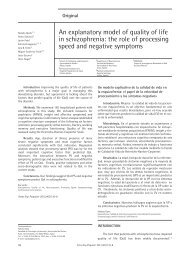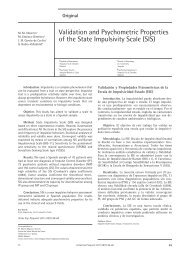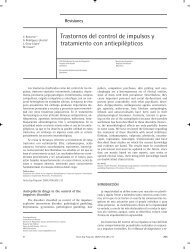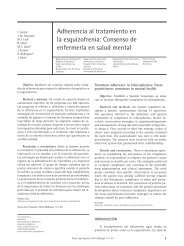Confabulaciones - Actas Españolas de Psiquiatría
Confabulaciones - Actas Españolas de Psiquiatría
Confabulaciones - Actas Españolas de Psiquiatría
You also want an ePaper? Increase the reach of your titles
YUMPU automatically turns print PDFs into web optimized ePapers that Google loves.
Esther Lorente-Rovira, et al.<br />
ciente <strong>de</strong> que está confabulando, siendo la creencia en el<br />
falso recuerdo genuina (ya que pue<strong>de</strong> actuar <strong>de</strong> forma consecuente<br />
con sus confabulaciones). Es <strong>de</strong>cir, se trata <strong>de</strong> un<br />
“mentir honesto”. Se han <strong>de</strong>scrito diferentes tipos <strong>de</strong> confabulaciones,<br />
utilizando una gran diversidad <strong>de</strong> criterios. Probablemente<br />
la clasificación más aceptada es la que distingue<br />
las confabulaciones espontáneas <strong>de</strong> las provocadas; no está<br />
clara la vali<strong>de</strong>z <strong>de</strong> esta distinción, <strong>de</strong> hecho, no se sabe con<br />
certeza si se refiere a un continuo <strong>de</strong> gravedad o a trastornos<br />
distintos con mecanismos patofisiológicos también diferentes.<br />
En cuanto a las regiones cerebrales cruciales implicadas<br />
en las confabulaciones, parece que para que aparezca este<br />
fenómeno, son necesarias las lesiones en el córtex prefrontal,<br />
específicamente en áreas ventromediales y orbitofrontales.<br />
La evi<strong>de</strong>ncia neuropsicológica sugiere, en la mayor parte<br />
<strong>de</strong> los estudios, al menos cierto grado <strong>de</strong> disfunción <strong>de</strong> memoria<br />
así como <strong>de</strong> disfunción ejecutiva como mecanismos<br />
subyacentes a las mismas. Sin embargo, las características<br />
específicas <strong>de</strong> estas disfunciones neuropsicológicas no son<br />
bien conocidas.<br />
BIBLIOGRAFÍA<br />
1. Schni<strong>de</strong>r A. The Confabulating Mind. How the brain creates<br />
reality. Oxford: University Press; 2008.<br />
2. Korsakoff SS. Psychic disor<strong>de</strong>r in conjunction with peripheral<br />
neuritis (Traducido por M. Victor y P.I. Yakovlev). Neurology<br />
1955;5:394-406 (Trabajo original publicado en 1889).<br />
3. Bonhoeffer K. Der Korsakowsche Symptomenkomplex in<br />
seinen Beziehungen zu <strong>de</strong>n verschie<strong>de</strong>nen krankheitsformen.<br />
Allgemeine Zeitschrift für Psychiatrie 1904;61:744-52.<br />
4. Wernicke K. Grundriss <strong>de</strong>r Psychiatrie, 2nd edn. Leipzip: Thieme;<br />
1906.<br />
5. Pick A. Zur Psychologie <strong>de</strong>r Confabulation. Neurologische<br />
Zentralblatt 1905;24:509-16.<br />
6. Kraepelin E. Psychiatrie, vol 2, 8th edn. Leipzig: Barth; 1910.<br />
7. Berrios GE. Confabulations: a conceptual history. J Historical<br />
Neurosci 1998;7(3):225-41.<br />
8. Berrios G.E. Confabulations. En Berrios GE, Hodges JR,<br />
eds. Memory Disor<strong>de</strong>rs in Psychiatric Practice. Cambridge:<br />
Cambridge University Press; 2000. p. 348-68.<br />
9. Talland GA. Confabulation in the Wernicke-Korsakoff syndrome.<br />
J Nerv Ment Dis 1961;132:361-81.<br />
10. Berlyne N. Confabulation. Br J Psychiatry 1972;120:31-9.<br />
11. Mercer B, Wapner W, Gardner H, Benson DF. A study of<br />
confabulation. Arch Neurol 1977;34:429-33.<br />
12. Moscovitch M. Confabulation. En Schacter DL, ed. Memory<br />
Distortion, Cambridge, MA: Harvard University Press; 1995. p<br />
226-51.<br />
13. Hirstein W. Brain Fiction. Self-Deception and the Riddle of<br />
Confabulation. Cambridge MA: The MIT Press; 2005.<br />
14. Gilboa A, Moscovitch M. The cognitive neuroscience of<br />
confabulation: a review and mo<strong>de</strong>l. En. Bad<strong>de</strong>ley AD, Kopelman<br />
MD, Wilson BA, eds, Handbook of Memory Disor<strong>de</strong>rs, 2nd Edition.<br />
Chichester: John Wiley & Sons Ltd; 2002. p. 315-42.<br />
15. Kopelman MD. Two types of confabulation. J Neurol Neurosurg<br />
Psychiatry 1987;50:1482-7.<br />
<strong>Confabulaciones</strong> (I): Concepto, clasifi cación y neuropatología<br />
16. Kraepelin E. Dementia Praecox. Traducido por Barclay RM,<br />
Robertson GM. Edinburgh: Livingstone; 1919.<br />
17. Metcalf K, Langdon R, Coltheart M. Mo<strong>de</strong>ls of confabulation:<br />
a critical review and a new framework. Cogn Neuropsychol<br />
2007;24(1):23-47.<br />
18. Kapur N, Couglan AK. Confabulation and frontal lobe<br />
dysfunction. J Neurol Neurosurg Psychiatry 1980;43:461-3.<br />
19. DeLuca J, Cicerone KD. Confabulation following aneurysm of<br />
the anterior communicating artery. Cortex 1991;27:417-23.<br />
20. Dalla Barba G. Different patterns of confabulation. Cortex<br />
1993;29:567-81.<br />
21. Fischer RS, Alexan<strong>de</strong>r MP, D´Esposito M, Otto R.<br />
Neuropsychological and neuroanatomical correlates of<br />
22.<br />
confabulation. J Clin Exp Neuropsychol 1995;17(1):20-8.<br />
Schni<strong>de</strong>r A, von Däniken C, Gutbrod K. The mechanisms<br />
of spontaneous and provoked confabulations. Brain<br />
23.<br />
1996;119:1365-75.<br />
Kraepelin E. Über Erinnerungsfälschungen (1/3). Archiv für<br />
Psychiatrie und Nervenkrankheiten 1886;17:830-43. (citado<br />
en Schni<strong>de</strong>r A. The confabulating mind. How the brain creates<br />
reality. Oxford Univeristy Press; 2008).<br />
24. Victor M, Adams RD, Collins GH. The Wernicke-Korsakoff<br />
Syndrome. Phila<strong>de</strong>lphia: FA. Davis Company; 1971.<br />
25. Alexan<strong>de</strong>r MP, Freedman M. Amnesia after anterior<br />
communicating artery aneurysm rupture. Neurology<br />
26.<br />
1984;34(6):752-57.<br />
Vilkki J. Amnesic syndromes after surgery of anterior<br />
communicating artery neurysms. Cortex 1985;21(3):431-44.<br />
27. Schacter DL, Norman KA, Koutstaal W. The cognitive<br />
neuroscience of constructive memory. Annu Rev Psychol 1998;<br />
49:289-318.<br />
28. DeLuca J, Predicting neurobehavioral patterns following<br />
anterior communicating artery. Cortex 1993;29:639-47.<br />
29. Schni<strong>de</strong>r A. Spontaneous confabulation, reality monitoring,<br />
and the limbic system-a review. Brain Res Rev 2001;36(2-<br />
3):150-60.<br />
30. Schni<strong>de</strong>r A. Spontaneous confabulation and the adaptation of<br />
thought to ongoing reality. Nat Rev Neurosci 2003;4(8):662-<br />
71.<br />
31. Gilboa A, Alain C, Stuss DT, Melo B, Miller S, Moscovitch M.<br />
Mechanisms of spontaneous confabulations: a strategic<br />
retrieval account. Brain 2006;129:1399-414.<br />
32. Turner MS, Cipolotti L, Yousry TA y Shallice T. Confabulation:<br />
damage to a specifi c inferior medial prefrontal system. Cortex<br />
2008;44:637-48.<br />
33. Cunningham JM, Pliskin NH, Cassisi JE, Tsang B, Rao SM.<br />
Relationship between confabulation and measures of<br />
34.<br />
memory and executive function. J Clin Exp Neuropsychol<br />
1997;19(6):867-77.<br />
Barbizet J. Defect of memorizing of hippocampal mammilary<br />
origin. J Neurol Neurosurg Psychiatry 1963;26:127-35.<br />
35. Levine B, Black SE, Cabeza R, Sin<strong>de</strong>n M, Mcintosh AR, Toth<br />
JP, et al. Episodic memory and the self in a case of isolated<br />
retrogra<strong>de</strong> amnesia. Brain 1998;121:1951-73.<br />
36. DeLuca J. A cognitive neuroscience perspective on confabulation.<br />
Neuropsychoanalysis 2000;2:119-32.<br />
37. Johnson MK. Reality monitoring: Evi<strong>de</strong>nce from Confabulation<br />
in Organic Brain Disease Patients. En Prigatano GP, Schachter<br />
DL, eds. Awareness of Defi cit after Brain Injury. New York:<br />
Oxford University Press; 1991. p. 176-97.<br />
38. Johnson MK, O´Connor M, Cantor J. Confabulation, memory<br />
<strong>de</strong>fi cits, and frontal dysfunction. Brain Cogn 1997;34:189-<br />
206.<br />
39.<br />
Burgess PW, Shallice T. Confabulation and the control<br />
258 <strong>Actas</strong> EspPsiquiatr 2011;39(4):251-9 62

















